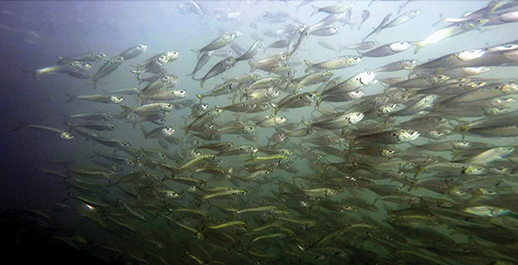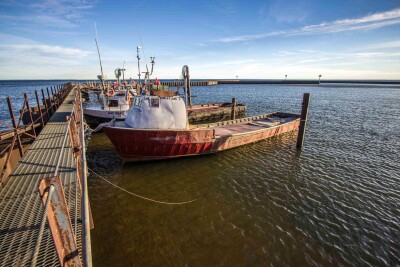A new menhaden stock assessment update for the Atlantic States Marine Fisheries Commission found the resource is not overfished nor experiencing overfishing.
The commission’s Aug. 3 acceptance of the report came as critics of Omega Protein’s reduction fishery fleet based at Reedville, Va., put more political pressure on state officials to restrict fishing in Chesapeake Bay.
Nets spilling menhaden that washed up on beaches was one source of the latest rancor. But the ASMFC actions at its meeting in Alexandria, Va., dealt with the larger, longstanding debate over the recreational fishing sector’s belief that menhaden purse seiners are removing too much forage fish that feed striped bass and other species.
“Significantly, this assessment was completed using new ecological reference points, standards that account for the needs of predator species when determining menhaden's sustainable status,” according to a statement from the Menhaden Fisheries Coalition, an industry group.
“The ASMFC's ecosystem-based reference points were developed over years, with support from industry, recreational fishermen, and environmental groups, to move away from managing species in isolation and consider the needs of predator species and the ecosystem as a whole,” the coalition says.
The stock assessment update comes after a coalition of 22 recreational fishing and marine industry groups sent a June 14 letter to Virginia Gov. Glenn Youngkin asking “that you move menhaden reduction fishing out of the Chesapeake Bay until science demonstrates that high volume reduction fishing for menhaden can be allowed without negatively affecting the broader Bay ecosystem.”
“The detrimental impact of menhaden reduction fishing on the ecosystem is so pronounced that it is prohibited in every state along the East Coast except Virginia. However, each year, over 100 million pounds of menhaden are being removed from the Chesapeake Bay and ‘reduced’ to fish meal and oil for pet food and salmon feed by a foreign-owned company – Cooke Inc.,” the sportfishing advocates wrote.
The campaign has been promoted by the American Sportfishing Association with a petition to Youngkin to end the commercial menhaden purse seine fishery. Recreational advocates contend the bay fishery is contributing to the currently overfished status of striped bass.
In a July 20 letter to Youngkin, Republican state legislator Timothy Anderson called for expelling the fishery from bay waters, citing a possible July 4 spill of menhaden from nets that washed up in Northampton County.
With the political temperature up, Omega Protein and its partners Ocean Harvesters acknowledged a July 25 fish spill. After making a set on fish off Kiptopeke State Park near Cape Charles in Northampton, the captain of a purse seine vessel noted a group of red drum in the net, according to a statement from the companies.
“He immediately instructed the crew to open the net and release the fish. The crew observed that many fish swam away, but the captain acknowledged that many fish likely died during the incident,” according to the statement.
The incident probably happened after a school of red drum swam below the menhaden, where they could not be seen by the boat’s spotter pilot circling overhead, the companies said. They notified the Virginia Marine Resources Commission and organized a cleanup of fish floating in the bay and called in a response crew to collect fish that washed ashore.
The ASMFC stock assessment update came as a boost for the commercial fishermen.
“Significantly, this assessment was completed using new ecological reference points, standards that account for the needs of predator species when determining menhaden's sustainable status,” according to the Menhaden Fisheries Coalition.
“In the past, single-species stock assessments that found menhaden to be healthy and not overfished were criticized by some for not taking into account interdependencies between species,” the group said. “The ASMFC's ecosystem-based reference points were developed over years, with support from industry, recreational fishermen, and environmental groups, to move away from managing species in isolation and consider the needs of predator species and the ecosystem as a whole.
“Despite this scientific finding, recreational special interests are continuing a campaign to end the menhaden fishery in the Chesapeake Bay.”
At the commission’s August meeting its Atlantic Menhaden Management Board approved a draft addendum to Amendment 3 to the interstate menhaden management plan, moving it forward for public comment.
The addendum considers potential changes to Amendment 3 provisions for commercial allocations; the episodic event set aside (EESA) program; and the incidental catch and small-scale fisheries (IC/SSF) provision.
According to a summary from the commission, “the EESA and IC/SSF provisions have been impacted by recent trends in landings, most notably in New England, which has seen an increase in abundance of menhaden and demand for bait in recent years.”
New England states rely on the EESA to keep their commercial fisheries open, while working to secure quota transfers from other states. Those trends have led to a rise in landings under the IC/SSF provision once commercial quotas have been met, according to the commission.
“The options in the draft addendum aim to align state quotas with recent landings and resource availability while maintaining access to the resource for all states, reduce dependence on quota transfers, and minimize regulatory discards,” according to the commission.







